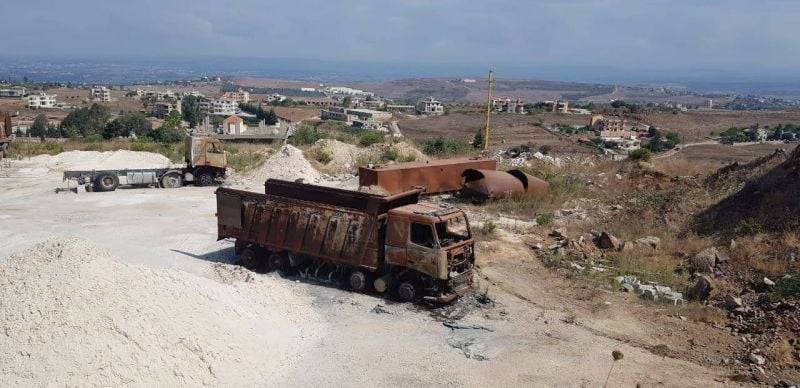
A charred tanker and scrap metal left at the site of an explosion in Tleil, Akkar, in 2021. (Credit: Michel Hallak/L'Orient Today)
BEIRUT — On Friday, the Court of Justice headed by Souheil Abboud and including judges Jamal Hajjar, Jean-Marc Oueiss, Afif Hakim and Maya Majed, questioned two men implicated in the August 2021 Tleil (Akkar) explosion: Richard Ibrahim (23) and Gergi Ibrahim (58). The questioning took place in the presence of Myrna Kallas, attorney general at the Court of Cassation. A new hearing has been set for Nov. 10.
The blast occurred on the night of Aug. 14-15, 2021, killing over 30 people and injuring more than 100 others. That night, amid nationwide fuel shortages, hundreds of people gathered around a fuel tank parked on land belonging to Richard Ibrahim's father, Georges Ibrahim, himself a nephew of Gergi Ibrahim, to benefit from its contents, which the army had just confiscated. Richard Ibrahim and Gergi Ibrahim are accused of having deliberately set fire to the premises during a brawl with local residents who had rushed to the site to stock up on fuel.
The Court of Justice is looking into the case on the basis of an indictment issued in July 2022 by the investigating judge at the Court of Justice, Ali Araji, against Gergi and Richard Ibrahim, as well as six other people, four of whom are still at large. The two other people arrested, Georges (Richard's father), owner of the land where the fuel tank that exploded was located, and Ali Faraj, (28), owner of a fuel station in Wadi Khaled and presumed owner of the tank, were among the defendants in Friday's hearing. They are accused of having stored the fuel with a view to selling it on the black market, a charge for which they were questioned last March.
A bulldozer to tip over the tank
Richard and Gergi Ibrahim were questioned in the presence of their respective lawyers. Victims' lawyers were also present, including the former president of the Tripoli Bar, Mohammad Mrad.
Both defendants denied any knowledge of the relationship between Georges Ibrahim and Ali Faraj, claiming that they only knew the latter by sight. Richard Ibrahim said that on Aug. 14, at around 5 p.m., he saw around 100 people in the vicinity of his father's home. According to him, Pierre, a relative, then brought a handgun on his own initiative. "I wore it on my waist to show off," Richard Ibrahim added, assuring that he then went to the village to take part in the Assumption Day celebrations before returning to the field around midnight. "I then asked the army officer there to stop what was happening, but he refused, on the grounds that he had received instructions from his command to empty the tank that very night," Richard Ibrahim said. "The officer then ordered a soldier to unlock the tank," he continued, pointing out that "brawls broke out between those present themselves." He went on, "I then decided to go and find a bulldozer to overturn the tank," claiming that he had "barely gone about 40 meters [towards the bulldozer], when the tank exploded."
Richard and Gergi Ibrahim both stated that they had not seen each other prior to the explosion, contradicting the claims of witnesses previously heard by the Court of Justice that Richard had asked to "burn the people present" by handing a lighter to Gergi, who immediately lit it. Paradoxically, both men testified that they had been standing next to the same army officer for part of the time leading up to the explosion, but had not made eye contact.
Gergi Ibrahim, for his part, refuted all the statements he had previously made to the investigating judge at the Military Court, Fadi Sawan, to whom the case had originally been referred. In response to a question from the president of the Court of Justice, Souheil Abboud (President of the Higher Judicial Council), who asked him whether he confirmed his confession to the military court that he had lit the lighter, Gergi Ibrahim denied that he had, justifying his earlier statements by the fact that he was on medication. "Many people on the spot were smoking," he said, pointing out that his legs had been burned and that he had been immediately hospitalized.
